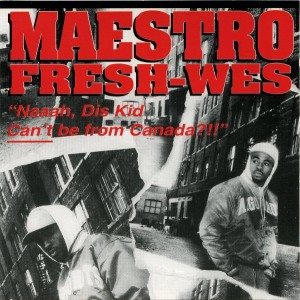 Harrison Samphir is repping Winnipeg.
Harrison Samphir is repping Winnipeg.
Too often are discussions of ‘90s rap confined to the music that arose from the five boroughs of New York City or from South Central Los Angeles. While these cities are the bedrock of hip hop culture, it’s often helpful to look to the periphery, namely Canada, for some of the most overlooked (see: “slept on”) records of that decade. In this list we catch a glimpse of just a few of them. They’re windows into what writer and critic John Murray Gibbon called the “cultural mosaic”, a mix of ethnic groups producing rather unique works of art and creativity.
Maestro Fresh Wes — Naaah, Dis Kid Can’t Be from Canada?!! [Attic 1994]
 “Put this in your collection/Fresh Wes without a rhyme is like Certs without the Retsyn”
“Put this in your collection/Fresh Wes without a rhyme is like Certs without the Retsyn”
Maestro Fresh-Wes is considered by many to be Canada’s first legitimate rapper; authentic because he embraced a burgeoning culture, and respected for making it his own. Today, the emcee whose real name is Wesley Williams is an ambassador for the Canadian hip hop community, an accomplished television actor and radio personality who frequently appears on the CBC. Naaah, Dis Kid Can’t Be from Canada?!! is actually Maestro’s fourth studio album, but the first in which he donned a black hoody and Timberland boots, partnered with the DITC’s Showbiz and put down a record aspiring to equal the achievements of American artists like Lord Finesse, Big Daddy Kane and Redman. Though it failed commercially, the album turned in head-nodders like “Check My Vernacular” (“Simply spectacular, smooth like an Acura”) and “Certs Wid Out da Retsyn”. Compared to his previous albums, the lyrical content on this record has authority, a grandiose battle rap mentality that reflects its name – Maestro wants listeners to know he’s for real.
Kish — A Nation of Hoods [ISBA Music Entertainment Inc. 1994]
Andrew Kishino moved to Los Angeles in 1999 to pursue a career as a voice actor in video games and animated movies, but the Toronto-born Japanese-Canadian was an emcee first. Under the name Kish he became the first Canadian rapper signed to a major label and spent the better part of the ‘90s paving the way for future T.O. artists while sharing the stage with Run-D.M.C., Chubb Rock and Naughty by Nature. A Nation of Hoods is the follow-up to his debut record Order from Chaos (1991) and features production by Sir Scratch and K-Cut from Main Source. Its boom bap style is a raw outgrowth of east New York crate-digging, but A Nation of Hoods is also one of a handful of albums representing a nascent hip hop community which grew to prominence in Canada around the year 2000. In other words, this is vintage Canadian rap at its finest.
Thrust — Past, Present, Future EP [Knowledge of Self, 1996]
 Despite being ignored repeatedly in the mainstream, Thrust (Chris France) is an enigmatic legend in Canadian hip hop history. Lyrically complex, nuanced and intelligent, he’s held down simultaneous careers as a touring artist and as an educator at the Harris Institute in Toronto. Past, Present, Future is an expectedly overlooked release, but one that was played heavily on college radio stations in the mid- to late-‘90s. Punchy drums, live instrumentation and scratching make it a blend of jazz hop (think A Tribe Called Quest) and grimy, underground styles. On “Do You Understand?”, produced by Scam (David Bujalski) of Toronto’s Concrete Mob, Thrust raps with a stop-and-go cadence: “It’s the outdoor material, word/Imperial, luck like that charm in your cereal.” Today, Thrust is known to young cats as a teacher. His rapping days are mostly behind him, but this EP will forever stand as a relic of Toronto’s hip hop golden age.
Despite being ignored repeatedly in the mainstream, Thrust (Chris France) is an enigmatic legend in Canadian hip hop history. Lyrically complex, nuanced and intelligent, he’s held down simultaneous careers as a touring artist and as an educator at the Harris Institute in Toronto. Past, Present, Future is an expectedly overlooked release, but one that was played heavily on college radio stations in the mid- to late-‘90s. Punchy drums, live instrumentation and scratching make it a blend of jazz hop (think A Tribe Called Quest) and grimy, underground styles. On “Do You Understand?”, produced by Scam (David Bujalski) of Toronto’s Concrete Mob, Thrust raps with a stop-and-go cadence: “It’s the outdoor material, word/Imperial, luck like that charm in your cereal.” Today, Thrust is known to young cats as a teacher. His rapping days are mostly behind him, but this EP will forever stand as a relic of Toronto’s hip hop golden age.
Choclair — What It Takes EP [Knee Deep Records 1997]
 Unlike the United States, Canada is not a melting pot in the strictest sense of the term. Although many people emigrate to the country for its strong social safety net and open skies, they never leave behind their diverse cultures and nationalisms. Canadian hip hop music is greatly affected by this type of assimilation. In the case of Choclair, the Scarborough, Ontario-born rapper with Jamaican heritage, his sound coalesces East Coast hip hop, Caribbean island music and Canadian sentimentality. With a rhyme style bordering on reggae ‘toasting’, each word slips into the next. What It Takes is his first release on the now defunct Knee Deep Records, featuring four versions of the title track (R&B singer-songwriter Jully Black appears on the original) and the laid-back summer groove “Just a Second”. This EP earned a Juno Award nomination for Best Rap Recording in 1997, sparking a career Choclair still continues today.
Unlike the United States, Canada is not a melting pot in the strictest sense of the term. Although many people emigrate to the country for its strong social safety net and open skies, they never leave behind their diverse cultures and nationalisms. Canadian hip hop music is greatly affected by this type of assimilation. In the case of Choclair, the Scarborough, Ontario-born rapper with Jamaican heritage, his sound coalesces East Coast hip hop, Caribbean island music and Canadian sentimentality. With a rhyme style bordering on reggae ‘toasting’, each word slips into the next. What It Takes is his first release on the now defunct Knee Deep Records, featuring four versions of the title track (R&B singer-songwriter Jully Black appears on the original) and the laid-back summer groove “Just a Second”. This EP earned a Juno Award nomination for Best Rap Recording in 1997, sparking a career Choclair still continues today.
Saukrates — Brick House EP [Serious Entertainment 1997]
 “Amaze dudes in rap crews/Lay it down, kids could never walk a mile in my shoes”
“Amaze dudes in rap crews/Lay it down, kids could never walk a mile in my shoes”
Saukrates is one of the smoothest flowing, most street-wise Canadian emcees to ever grace the mic: his penchant for verbal illustration, clever metaphors and similes, helped popularize Canadian rap in the United States even before the “Northern Touch” arrived in ‘98. The dreadlocked Torontonian of Guyanese descent was just 18 years-old when his Brick House EP dropped, but it sold 20,000 copies and earned respect as a top urban release among underground rap fans. Common, O.C. and No I.D. make appearances over eight tracks including original and remixed versions of “Play Dis” and “Rollin”. Both would later appear in remastered form on Saukrates’ debut LP The Underground Tapes in 1999. Stop sleeping on this record, or really, all of them.

